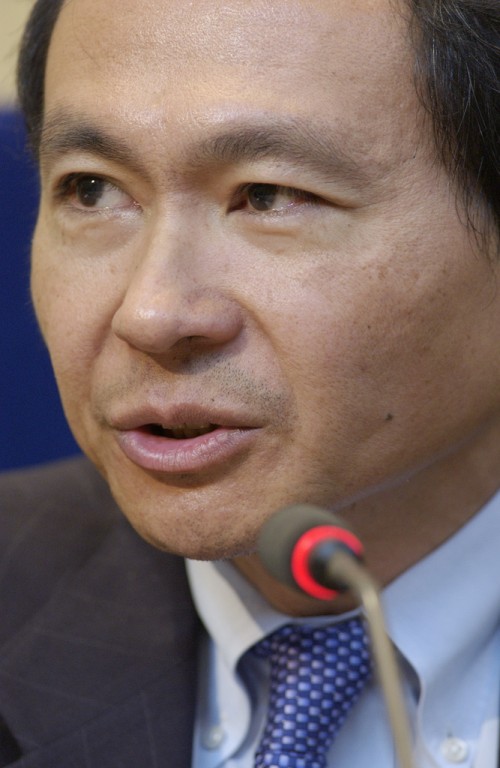Francis Fukuyama |
Francis Fukuyama is a leading American politicalscientist, political economist, and author best known for his books The End ofHistory and the Last Man (1992) and the Origins of the Political Order. He serves as a Senior Fellow at the Center onDemocracy, Development and the Rule of Law at Stanford University.
EMANUEL PASTREICH:
We have to start with the simplest of questions. If we want tounderstand the challenges in East Asia today, we must first consider why it isthat Asia has becomeso central in the global economyand why it plays an increasingly large role in global politics. How do you explain theenormous shift that we are witnessing today?
FRANCIS FUKUYAMA:
Well, there is a significant difference between the economic and the politicalspheres. Obviously, thebiggest shift is to be observed in the economic realm. We can trace it back to the industrialization of China after the Cultural Revolution and rise ofthe four tigers: South Korea, Singapore, Taiwan and Hong Kong. But the shift interms of political power is a much slower process than the economic shift.
Overall, Asiapunches below its weight in terms of its ability to shape the rules for theglobal system and the direction that global governance is evolving towards. Itis an issue of what Joseph Nye refers to as “soft power” the ability of anation to project ideas and concepts, build influential institutions andpractices. The lag at the level of idea is even more severe than the lag interms of political power.
So if we talkabout the rise of Asia, we must be sure that we are clear about what aspect ofthe rise we are referring to. If we ask the specific question, "Why has EastAsia’s economic development been so successful?" We can speak with moreconfidence about a clear rise, although that rise does not necessarily fulfillall the traditional expectation for growing power and influence. We can besure, however, that China will continue to increase its influence in global affairsfor the foreseeable future.
EMANUEL PASTREICH:
And yet China’srise is profoundly paradoxical. China is increasing influence in the politicaland economic spheres today, and is engaged in large-scale aid projects that areunprecedented in its history. At the same time, if you go to Shanghai, you willfind more and more Chinese students studying English and trying to go abroad tostudy at American universities. There is more interest, not less, in moving toadvanced countries now than was the case twenty years ago. The phenomenon seemsrather paradoxical.
FRANCIS FUKUYAMA:
The trend isreal, but it perhaps has more to do with the fact that there are simply moreChinese who have the money to send their children to the United States fortheir studies than anything else. Nevertheless, we can see that although China has theeconomic, the cultural and educational soft power is still lacking.
For all itsweaknesses, the United States projects a tremendous amount of soft powerglobally. China cannot match that power yet.
EMANUEL PASTREICH:
But what is itexactly that gives the U.S. that advantage? Why has it been so hard for China,Korea and Japan, in spite of astounding economic growth, to have that sort ofcultural impact? Certainly the cultures are extremely sophisticated and thelevel of education is very high.
FRANCIS FUKUYAMA:
We are seeingsome changes these days, but the building of institutions, the growth of globalnetworks, and the acceptance of new cultures takes generations.
Korea has donewill in terms of culture. If you look at the spread of K-pop, Korean soapoperas and Korean movies, Korea is producing a highly competitive culture thatis expanding rapidly, even including spheres like manga and anime that wereonce exclusively Japanese. But such cultural influence has very little to dowith GDP.
Significantshifts may come, but they will not be fast.
EMANUEL PASTREICH:
I suppose thatthe dominance of the English language is also an important factor.
FRANCIS FUKUYAMA:
The power ofEnglish has a long history, dating back to the British Empire, but itscontinued dominance is in part a reflection of culture, and in part a reflectionof U.S. dominance in international business. In spite of the remainingdominance of English, we can perceive significant shifts. People are startingto learn Mandarin around the world, and that trend will continue. For some inAfrica, Chinese seems like a very significant language. Eventually culturalinfluence will follow from growing economic power, but the lag time issignificant.
And we are in anage of unprecedented age of globalization that defies previous precedents. Forexample, if you read the published statistics concerning members of the ChineseCentral Communist Party committee, you will see that an extraordinary number ofthem have either a relative living abroad or own property abroad. They arecommitted to a global economy and they have an interest in the economy of theUnited States. We can see those overseas investments as a way to stash thecash, but there is also a sense in which those overseas investments are asecurity net of sorts. I do think there's a sense that Western countries,whatever problems they may have, are fundamentally more stable politically thandeveloping nations.
Therefore,despite all of China's remarkable success, continued stability and prosperityis not something that they can take for granted. The accumulation of capital isnot a replacement for quality of life, for getting a quality education, havingsafe food to eat. Even the superrich in Beijing can have kids with asthma whobecome terribly sick because of air pollution.
EMANUEL PASTREICH:
The author LeeChang Rae recently published a novel entitled On Such a Full Sea describing an authoritarian state in a megacityB-Mor (the former Baltimore) which is populated with immigrants from a villagein “New China” that become uninhabitable because of climate change. The novelsuggests that we may encounter a world quite different than our common “riseand fall of great powers” assumptions and that technology and climate changewill be major factors.
The entire world is being impacted by China’srise and Lee Chang Rae’s scenario is not far-fetched.
FRANCIS FUKUYAMA:
There is a debate in the West,and to some degree in China, as to whether China is really capable offundamental innovation. I probably fall into the camp of those who say that youwe should not underestimate China's ability to make profound shifts. China haschanged far more than anyone imagined since the Cultural Revolution and it hasa long history of institutional transformation. Although much of China’s recent economic andintellectual progress has been a form of catch-up. China is a vast countrywith many smart people. I would not assume that just because China lacks great politicalfreedom that this means China isn't going to be able achieve astoundingprogress, to innovate in technology and institution building.
EMANUEL PASTREICH:
Certainly Chinahas a long tradition of good government and of institutional innovation. Fromthe Tang and Song Dynasties to the Ming and Qing Dynasties, China has been ableto generate internal reform on many occasions.
There have beensome scholars like Daniel Bell at Tsinghua University, in his book The ChinaModel: Political Meritocracy and the Limits of Democracy, or Zhang Weiwei ofFudan University in his book The ChinaWave: Rise of a Civilizational State, who argue that China is fundamentallydifferent than other nations in that it is a civilization, not a nation state.Is there perhaps something transformative of China, that seeks to remake theentire world, not just expand into new markets?
FRANCIS FUKUYAMA:
I'm a little skeptical of suchefforts to see some sort of new Confucian vision in the chaos that is thepresent Chinese political economy. I just do not see an integrated package; it'san incoherent package. The official message coming out of China in its officialsources is still taking Marxism-Leninism as its base. Perhaps there is asincerely interest in the past, but basically Chinese are pretty confused aboutConfucianism. Although it may feel good to think on is building on a greattradition of millennia. But when push comes to shove they are back to Marxismor neoliberalism. They end up filling the ideological vacuum with consumerismand greed. As long as the economic growth keeps up, they will be alright. But Ido not see too much Confucian civilization in the hard choices that Chinesepoliticians make.
EMANUEL PASTREICH:
But in the Westthings are at last shifting a bit. Western intellectual are taking a strongerinterest in Asia and reading and writing about China and its culture andpolitics. How broad is the interest in East Asia in Washington D.C.?
FRANCIS FUKUYAMA:
Although interestin Asia has risen remarkably, it is probably still far from what it should be.The rise of China has triggered broad introspection about Western and Americaninstitutions and their shortcomings. There have been some debates in thefringes, but the serious reorientation has not started. Most people in the Westacknowledge there is a new drive in China and they express concern about joblosses in the United States. But there are few who look at the rise of Chinaand East Asia as a challenge to the dominance of Western civilization.
EMANUEL PASTREICH:
What do youthink is the primary challenge to the U.S. and Europe today?
FRANCIS FUKUYAMA:
Many social scientists in theUnited States have postulated that economic freedom without a correspondingdegree of political freedom is not sustainable. They assume that China willhave to open up its political system and to democratize in one way or another. Butthere are serious problems with this assumption. If we think long term, saythirty years in the future, could we have a China in which economic growth issignificantly higher than that in the West, a Chinese economy that hascompletely displaced the U.S. in scale and impact, but still have a China inwhich the government calls the shots domestically and internationally? Such ascenario is entirely possible and could create immense challenges to currentglobal institutions. Few in the West want to imagine such an outcome. But thatis not an excuse for presenting wishful thinking as critical analysis.
EMANUEL PASTREICH:
At the sametime, the question of freedom is a complex one. Certain areas of Shanghai, forexample, have access to Facebook and Google and there are virtually no cases ofinterference from the government—if you are part of the “internationalcommunity.” Many American expats feel oddly freer in that Chinese environment.
FRANCIS FUKUYAMA:
Yes, there areclearly pockets in China that are quite open these days. Globalization producesall sorts of complexities.
EMANUEL PASTREICH:
And what aboutEurope? How has the rise of Asia impacted France, Germany, Italy and otherEuropean powers?
FRANCIS FUKUYAMA:
What is strikingabout Europe is just how little attention they pay to China. Although I wishthe United States took Asia seriously, compared with Europe, we are doing apretty good job. You would be amazed to see how much Europeans still aretalking about the challenge from America and the American model for business. Theyare having trouble getting their heads around the fact that China going to be amajor player in the world and that what happens in the Chinese economy impactsthe European economy. Similarly, the study of China, Japan and Korea in Europe isfar behind the United States. There are not that many Chinese speakers andalmost no one who can deliver a speech or read a book in an Asian language.
EMANUEL PASTREICH:
We have stressedChina so far in our conversation, but in reality Korea and Japan remain quite significant.Might there be a risk that America focuses too much on the China challenge andloses track of the important developments in the rest of Asia. After all, Koreaand Japan are major players in Southeast Asia and Africa, often displaying agreater sophistication than China.
FRANCIS FUKUYAMA:
Asia is polycentric,multipolar, and constantly evolving. There is no uniformity in Asia in terms ofgeopolitics and culture and each of those countries is a separate world toitself, even as it overlaps in trade and commerce with its neighbors and withthe United States. It is a challenge for Americans to keep up with that region.
The conditions are reallydifferent in each country. If we take a slightly longer-term horizon, all ofAsia will be caught in this demographic trap (declining and aging population)which may have unintended consequences. Japan was the first to experience thatshift, and we have seen articles about aging villages in the Western media forsome time. But the trend for the future is actually more severe in Taiwan,South Korea and Singapore. These countries are struggling to come up with somesolution to the aging population crisis, and the resulting growth of amulti-cultural society.
EMANUEL PASTREICH:
But if you looked atmiddle-class and upper-middle class Caucasians in Europe or the United States,is not that population is more or less following the same trajectory as theaging populations of Korea or Japan.
FRANCIS FUKUYAMA:
One cannot makesweeping statements. The fertility rates for Caucasians in the United Statesremains higher than that of countries like Korea and Japan. In the case of Scandinaviafertility rates have risen above the replacement rate. I speculate thatcountries that have the lowest fertility rates in the world are those in whichyou have a high level of female education, but still socially conservative moresthat limit career opportunities for women. That is exactly what we find in Japan,Korea, Taiwan and Singapore, where a lot of women don't want to enter intomarriages that require them to stay home and raise families, but the childcarefacilities necessary for them to pursue careers do not exist. In Japan, theaverage age for the marriage of women keeps rising every year.
EMANUEL PASTREICH:
It's amazing thatalthough many families in Korea or Japan place so much emphasis on educationfor both boys and girls, there is an absolute distinction after graduation fromcollege. Equality of opportunity suddenly ends when the student receives adiploma. It's truly paradoxical.
FRANCIS FUKUYAMA:
I met aprofessor at Julliard who was just livid because although many of his bestpiano students are Korean women, not a single one of them has turned thattalent into a career as a musician. Despite all their talents, they dutifullygo back to Korea and marry a rich corporate executive. Their outstanding musicaltalent becomes, he lamented, but an adornment, a hobby. There was noopportunity for those women to pursue a career in music.
EMANUEL PASTREICH:
Let us talkabout the current tensions in Asia, specifically those between China, Japan,and Korea. What we witness today is fundamentally paradoxical. Although somemake grim analogies between Asia today and Europe just before World War I, itseems to me that the conflicts over islands are fundamentally different in itsnature from the battle over territory occupied by large populations.
FRANCIS FUKUYAMA:
I think theconflicts are quite serious because they are powered by the rise of nationalismin Korea, Japan, and China. Young people in each of these countries are growingmore nationalistic than was their parents' generation, and that trend is quitedangerous. Honestly, I am quite worried by what I see happening today. Theterritorial disputes are not inherently critical, but they take on tremendoussymbolic significance and they are at the center of a struggle overgeopolitical power. The fight over the future of the Senkaku Islands is notjust about a few uninhabited rocks. It is a contest over who will set the rulesin Asia, China or Japan. It is this larger question that absorbs the interestsof both countries.
EMANUEL PASTREICH:
It's still a differentsituation from, say, Alsace-Lorraine; no one lives there after all.
FRANCIS FUKUYAMA:
Sure, no one wantsto start a war over a stupid bunch of rocks. But history shows that strangethings like that can happen.
EMANUEL PASTREICH:
What are yourthoughts about the U.S. and its position in East Asia? What do you think is theappropriate role for the U.S. to play in Asia going forward?
FRANCIS FUKUYAMA:
I think the U.S.needs to adjust to growing Chinese power but needs to be mindful of existingcommitments. The accommodation of Chinese power cannot come at the expense oftraditional allies--Japan, Korea, etc. Doing that is going to be verydifficult. In the case of Japan, the Japanese have actually provoked a lot ofthe problems that they're in right now, by the kind of nationalistic planes ofrevisionism that is going on there.
EMANUEL PASTREICH:
I am concernedby nationalist activities throughout East Asia. But as someone who taughtJapanese studies for many years, I am disturbed especially by the purging of informationabout the Second World War from school history books and the shutting down ofmuseums that provide an accurate narrative of what Japan did during the war.Japan is a sophisticated nation with a highly educated population. Such stepsare just wrong.
FRANCIS FUKUYAMA:
There aredefinitely a lot of disturbing trends in Japan. The majority of the Japanesepeople do not support these actions, but there is a significant nationalistic rightthat has not accepted the outcome of the Second World War in the way that the Germanshave.
EMANUEL PASTREICH:
You have grownup in the United States, but your family is from Japan. Does that impact yourperspective?
FRANCIS FUKUYAMA:
My perspective onEast Asia is completely American. I have no sympathy for the Japanesenationalists. The United States has an alliance commitment to Japan, but theposition Japan has taken on many disputes with its neighbors has been self-defeating.
EMANUEL PASTREICH:
Coming back theUS role in East Asia—you suggest that the United States must engage China, andrecognize its new status, but that there may also be some legitimate reasonsfor the United States to remain wary of China’s intentions. What specificallymust the United States do to create a stable security architecture in EastAsia?
FRANCIS FUKUYAMA:
I feel that theU.S. needs to promote multilateralism in Asia and to consider multilateralismto be in its own long-term interests. The United States has certain advantages inits bilateral alliances. But the use of bilateral relations in Asia can alsoundermine American influence.
For example,China would like to deal with all ASEAN countries individually, throughbilateral exchanges. But can we solve the complex multilateral disputes over coralreefs in the Pacific by a series of bilateral discussions? I think we need todo so through ASEAN, other international bodies, or new institutions that wewill build.
I made a proposalin Foreign Affairs about a decade ago for a multilateral structure relatedto diplomacy and security in which all countries, including China, can talk openlyabout defense budgets, confidence-building measures, and other topics and cometo meaningful resolutions.
EMANUEL PASTREICH:
Ihave noticed thatKoreans, whether politically conservative or liberal, are committed to amultilateral vision of the future. Unlike the United States or Japan, there isno conservative faction that wants to dismantle multilateralism and pursuenational military power without regard for international opinion. Perhaps thismatter is a result of Korea’s position in multiple trade agreements that makeits economy inherently multilateral.
FRANCIS FUKUYAMA:
I have noticed a stronginterest in multilateral institutions in Korea. Such arrangements serve as a force-multiplier.
EMANUEL PASTREICH:
Let me close with a questionabout technology. How do you think evolving technologies (drones, cyberspaceand other technologies with dual uses) are changing the nature of conflict andinternational relations, and what are the implications of those changes forEast Asia?
FRANCIS FUKUYAMA:
I think you can see profoundchanges already in cyberspace. Already there are essentially no ruleswhatsoever. For example, if you hack into another country's computer system, whetherthe computer belongs to a corporation or to the military, does that constitutean act of war? Who counts as a representative of the government of a country incyberspace?
We have no agreement about theremedy to growing cybercrime. In fact we do not even agree on what kinds ofresponses are acceptable. Even if you do know who committed the crime, expertsdo not agree on how serious it is. And numerous reports of hacking have tendedto make the public somewhat skeptical.
I suspect that rules andregulations about online crimes are going to be harder to enforce simplybecause the technology is so rapidly changing and often it is hard to showthere has even been a crime.
Most Read
-
1
-
2
-
3
-
4
-
5
-
6
-
7






















